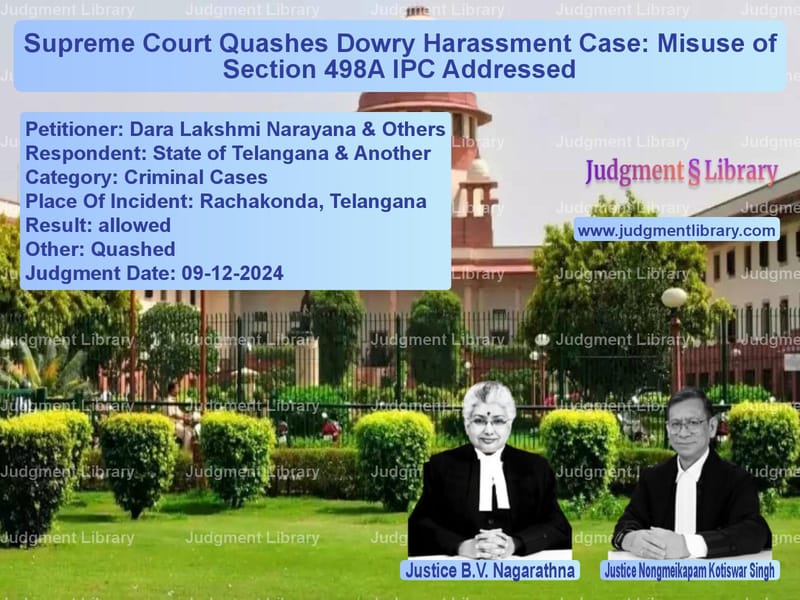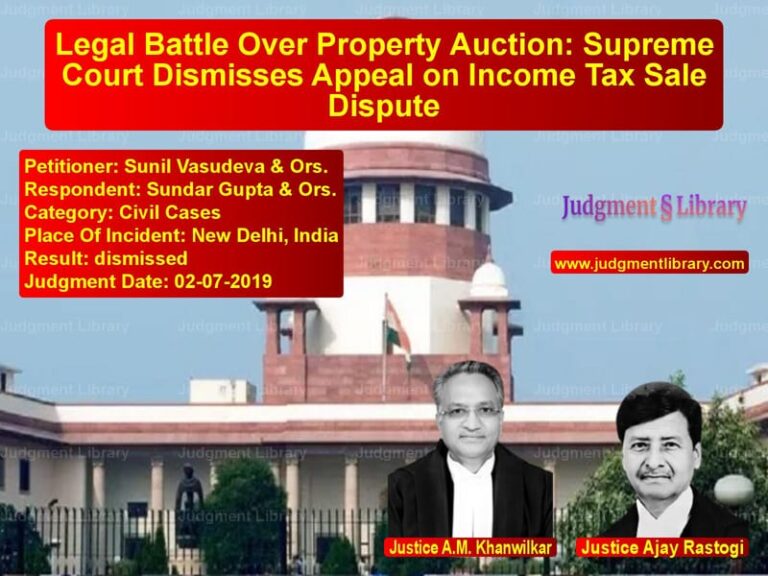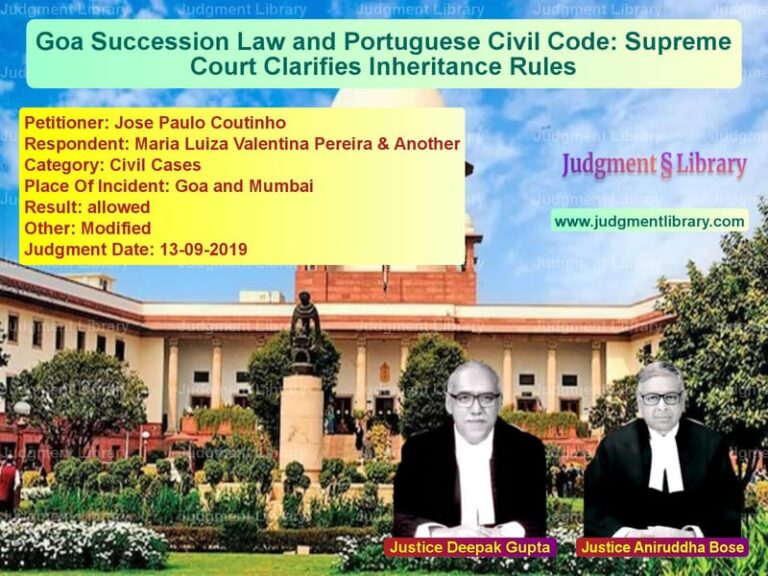Supreme Court Quashes Dowry Harassment Case: Misuse of Section 498A IPC Addressed
The Supreme Court of India recently delivered a significant judgment in the case of Dara Lakshmi Narayana & Others vs. State of Telangana & Another, dealing with allegations of dowry harassment under Section 498A of the Indian Penal Code (IPC) and Sections 3 and 4 of the Dowry Prohibition Act, 1961. The case highlights how laws meant to protect women from cruelty and harassment can sometimes be misused as a tool of retaliation.
Background of the Case
The case revolves around a matrimonial dispute between appellant No.1 (husband) and respondent No.2 (wife). The couple got married on March 8, 2015, at Chennakesava Swamy Temple, Andhra Pradesh. The other appellants include the husband’s family members:
- Appellant Nos.2 and 3: Father-in-law and mother-in-law
- Appellant Nos.4 to 6: Sisters-in-law
Respondent No.2 lodged an FIR (No.82 of 2022) on February 1, 2022, at Neredmet Police Station, Rachakonda, alleging that her husband and his family members harassed her for additional dowry. She claimed that at the time of marriage, her father gave Rs.10 lakhs, 10 tolas of gold, household articles, and Rs.5 lakhs in marriage expenses.
Allegations in the FIR
The FIR alleged the following:
- Appellant No.1 (husband) harassed respondent No.2 physically and mentally, demanding additional dowry.
- Appellant No.1 used abusive language, suspected her character, and often returned home drunk.
- He allegedly had an extramarital affair with a woman named Mounika.
- Appellant Nos.2 to 6 (in-laws) instigated the husband to demand more dowry.
Legal Battle Begins
Petition for Quashing FIR
The appellants moved the Telangana High Court seeking to quash FIR No.82 of 2022, arguing that:
- No dowry demands were ever made.
- Respondent No.2 left the matrimonial house multiple times without informing her husband.
- On October 3, 2021, she left the house, and her husband filed a police complaint on October 5, 2021. She was later found staying elsewhere.
- On November 11, 2021, she admitted in writing to the police that she left due to personal issues and promised not to repeat such actions.
- Despite this, she again left the house and, when appellant No.1 sent a legal notice seeking mutual divorce on December 13, 2021, she retaliated by filing the FIR on February 1, 2022.
High Court’s Decision
On February 16, 2022, the Telangana High Court refused to quash the FIR but directed the police to follow procedural safeguards under Section 41-A CrPC as per Arnesh Kumar vs. State of Bihar (2014). It also granted protection from arrest until the chargesheet was filed.
Supreme Court’s Observations
The Supreme Court examined whether the FIR should be quashed under the principles laid down in State of Haryana vs. Bhajan Lal (1992). It reiterated that:
- Criminal proceedings should be quashed if the allegations are vague and unsupported by evidence.
- There should be specific, not general allegations against each accused.
- Courts must prevent misuse of legal provisions for personal vendetta.
Findings on Dowry Allegations
- The Court noted that respondent No.2 failed to provide specific instances of harassment related to dowry.
- The claims of dowry harassment surfaced only after the divorce notice was served.
- There was no evidence supporting the allegations against appellant Nos.2 to 6.
On Misuse of Section 498A IPC
The Court expressed concern over the growing misuse of Section 498A IPC in matrimonial disputes:
“The insertion of Section 498A IPC was meant to protect women from cruelty. However, there has been an increasing tendency to use it as a tool for personal revenge. Making vague allegations without evidence leads to the abuse of legal provisions.”
On the Role of In-Laws
The Court highlighted that merely naming family members without specific allegations is insufficient for criminal prosecution:
“A mere reference to the names of family members in a criminal case arising out of a matrimonial dispute, without specific allegations, should be nipped in the bud.”
Final Verdict
The Supreme Court allowed the appeal and quashed the criminal proceedings, including:
- FIR No.82 of 2022 registered with Neredmet Police Station.
- Chargesheet dated June 3, 2022 filed in the Court of 1st Metropolitan Magistrate, Malkajgiri.
- The pending trial proceedings in the Court of 1st Additional Junior Civil Judge-cum-Additional Metropolitan Magistrate.
Implications of the Judgment
This ruling reinforces the need to prevent the misuse of legal provisions meant for the protection of women. Key takeaways include:
- False dowry cases can be quashed if allegations are vague and unsupported by evidence.
- Family members should not be implicated without specific and credible allegations.
- Court scrutiny is necessary to prevent harassment of innocent individuals in matrimonial disputes.
The Supreme Court’s decision ensures that genuine victims of dowry harassment receive justice while preventing the misuse of legal provisions for personal vendetta.
Petitioner Name: Dara Lakshmi Narayana & Others.Respondent Name: State of Telangana & Another.Judgment By: Justice B.V. Nagarathna, Justice Nongmeikapam Kotiswar Singh.Place Of Incident: Rachakonda, Telangana.Judgment Date: 09-12-2024.
Don’t miss out on the full details! Download the complete judgment in PDF format below and gain valuable insights instantly!
Download Judgment: dara-lakshmi-narayan-vs-state-of-telangana-&-supreme-court-of-india-judgment-dated-09-12-2024.pdf
Directly Download Judgment: Directly download this Judgment
See all petitions in Dowry Cases
See all petitions in Bail and Anticipatory Bail
See all petitions in Domestic Violence
See all petitions in Judgment by B.V. Nagarathna
See all petitions in Judgment by N. Kotiswar Singh
See all petitions in allowed
See all petitions in Quashed
See all petitions in supreme court of India judgments December 2024
See all petitions in 2024 judgments
See all posts in Criminal Cases Category
See all allowed petitions in Criminal Cases Category
See all Dismissed petitions in Criminal Cases Category
See all partially allowed petitions in Criminal Cases Category







